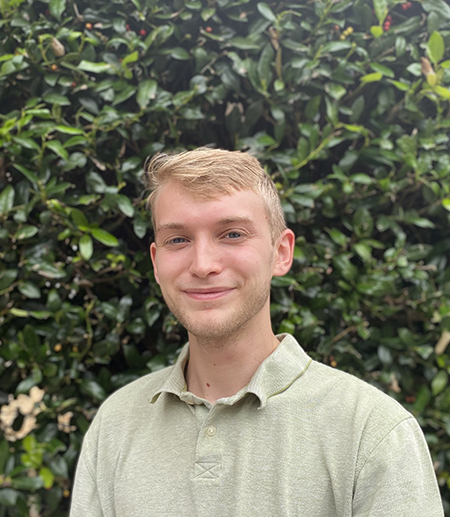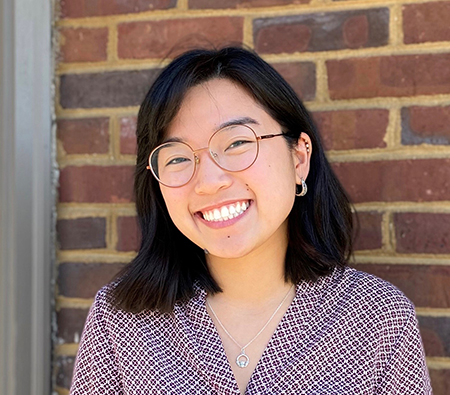Media contact: Savannah Koplon
 Luke Jaskowsi says that When people think of climate change, they don’t realize that it has a face. And that face is us. All of us. Two University of Alabama at Birmingham undergraduate students were selected to attend The United Nations Framework Convention on Climate Change in Glasgow, Scotland, this fall.
Luke Jaskowsi says that When people think of climate change, they don’t realize that it has a face. And that face is us. All of us. Two University of Alabama at Birmingham undergraduate students were selected to attend The United Nations Framework Convention on Climate Change in Glasgow, Scotland, this fall.
Rose Albert and Luke Jaskowski, students in the UAB College of Arts and Sciences’ Department of Chemistry, attended the 26th Conference of the Parties, followed negotiations and events at the conference to shape global climate action, and communicated experiences to the public.
These students will now serve as American Chemical Society climate ambassadors and communicate conference proceedings to promote climate literacy on UAB’s campus. They will also attend the American Chemical Society’s conference in the spring to report on their findings from the Glasgow Summit.
Since the conference comes with a wide breadth and depth of issues, each student chose their specialized areas of observation.
Albert, a senior pursuing a bachelor’s degree in chemistry and a master’s degree in public health, chose the environmental justice movement as her area of observation.
“For me, it was a transformative experience to see environmental injustices on a global scale. It helped me break through the barrier of a U.S.-centric view of climate change and dig deeper into the Green New Deal.”
The themes of environmental justice in terms of involvement, community engagement, active listening and centering the voices of those who are most impacted is globally pervasive at all levels of decision-making. Albert wants to take her experience at the summit and help the UAB community understand the importance of climate literacy and think globally.
“It is important that we don’t just talk about what we can do for Birmingham or the UAB community, but how these problems interface with the rest of the world,” she said. “Think globally, act locally.”
Albert has broadened her understanding of what environmental justice looks like on the global level and says it is a privilege to think about climate change as a future problem.
“If we just look around Birmingham, climate change is already here. It’s already happening and impacting people’s lives,” she said. “It’s the same patterns of inequity around the globe.”
According to Albert, it is important to ensure that other countries are compensated for their resources instead of focusing all the resources on the “Global North.” She learned about numerous climate problems at the summit, such as how corporate responsibility and systematic change are necessary to mitigate the crisis. However, empowering individual change is also vital.
“The numbers can be discouraging to think about because of how slow the needle can move. But identifying what changes ‘you’ can make and defining ‘your’ activism can really make a difference,” she said.
Albert plans to obtain a Ph.D. in toxicology and environmental health after graduation. Her overall goal is use science to influence policies that support communities who are overburdened by climate injustices, she says.
Jaskowski, a senior majoring in chemistry, chose Updates on the Paris Climate Agreement and its Implementation as his area of observation.
“There are a lot of discrepancies about what countries say they will do and what they actually do to mitigate climate change,” he said. “It was important at the conference that we gathered that information to see where we are headed.”
 Rose Albert motive is to "Think globally, act locally."The most exciting part of the conference, according to him, was seeing how the international climate policy comes down to a series of documents that state tremendous goals but lack storytelling.
Rose Albert motive is to "Think globally, act locally."The most exciting part of the conference, according to him, was seeing how the international climate policy comes down to a series of documents that state tremendous goals but lack storytelling.
“The documents don’t include stories of the people who are living with its impact every day — the crops they grow, the food they eat and the air they breathe. So, it’s important for us to tell those stories,” Jaskowski said.
After graduation, Jaskowski aspires to obtain a Ph.D. in chemistry and use that knowledge to advocate change in the government and its policies, and encourage people to use their civic power to engage and participate in climate action.
Both Albert and Jaskowski serve as officers for the UAB chapter of SAACS, which is consistently recognized as being an Outstanding Student Chapter by the national organization. Additionally, both serve as officers for UAB Green Initiative, a sustainability student organization.
“When people think of climate change, they don’t realize that it has a face,” Jaskowski said. “And that face is us. All of us.”